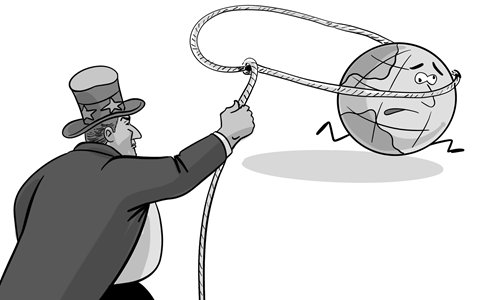HOME >> BUSINESS
Could India be next victim of US exceptionalism?
By Swaran Singh Source:Global Times Published: 2019/8/27 18:33:40

Illustration: Luo Xuan/GT
Recently, a book titled The American Trap has been making a splash in media and academic circles. Originally published in French as Le Piège Américain by Frédéric Pierucci, a former executive of the French rail company Alstom, it has since been translated into multiple languages. Its popularity is due to the fact that its theme has touched sensitive chords across global business circles. Nations and their businesses and scientific establishments have often suffered from the uncontested track record of successive US administrations, which use their domestic laws to punish foreign nationals for actions that occur outside legal US jurisdiction. Lately, this trend has accelerated as part of US President Donald Trump's "America First" policy which reasserts the uniqueness of their US "exceptionalism."
The US slapping harsh one-sided charges on foreign companies and their executives for defaulting self-righteous standards of behavior - especially with regards to corruption and breaches of US sanctions - has been a bone of contention between successive US administrations and other rising powers. Russia, China, India and occasionally other nations have repeatedly stood against the US' "unilateral" sanctions and their bullying, global-policing tactics. Nevertheless, the US continues to impose its domestic laws not only to punish its target's entities, but often to undermine or even take over its competitors in business and defense sectors.
In 2013, Frédéric Pierucci, author of The American Trap, was arrested upon arrival in New York. He would soon plead guilty to charges of authorizing bribes for Indonesian officials to win a boiler plant order for his firm. The investigations by the US Department of Justice ended in General Electric's $17 billion takeover of Alstom in 2014.
But such behavior over the years has led to the US Congress enacting scores of laws that seek to enforce US writs beyond the nation's borders. Experts refer to the US as "everybody's neighbor" with good cause - it has military deployments all around the world. One could begin with the 1946 McMahon Act that had prohibited any nuclear technology sharing, even with its allies whose scientists had been part of the historic Manhattan Project that made the US the most powerful nation among the victors after World War II. The US 1979 Nuclear Non-Proliferation Act prohibited the transfer of sensitive, dual-use nuclear technologies to nations suspected of building nuclear weapons or ballistic missiles, yet had no such weapons and were prohibited from domestic research and development.
Trump's presidency has seen the US walk out of several international arrangements, including the Trans-Pacific Partnership, the 2015 Iran nuclear deal and even the United Nation Human Rights Council. President Trump has become notorious for bulldozing his way through most summit meetings. He believes the whole world has been cheating the US with unfair trade practices, which leads him to unleash tariff hikes against anyone who crosses him. In dealing with his business rivals, the US Foreign Corrupt Practices Act of 1977 provides the conditions to pursue corruption cases overseas, provided that transactions are made in US dollars or that communications are made using emails that passed through US servers. This has led to the US slapping huge numbers of fines on several multinational corporations.
Frédéric Pierucci's 2013 arrest in New York particularly echoes the case of Huawei chief financial officer Meng Wanzhou. Such tactics threaten to make the US increasingly ineffective in leading global discourse. As a nation that was supposedly founded to protect "life, liberty and the pursuit of happiness," the US has a president who rails against China's so-called breach of intellectual properties and raises tariffs on imports from China - actions which have resulted in rising prices for American consumers. This increasing disjunction of American leaders, with their internal and external milieu, could make the now most powerful country increasingly irrelevant to the rest of the world.
The US may not directly hit Indian companies as it has done with China's Huawei and ZTE. This is because such actions from the Trump administration are guided by the need to protect its business interests against the two Chinese telecom companies that have emerged as world leaders. Indian firms present no such challenge to US interests. The Trump administration is seeking out ways to slow down China's rise as it views it as a threat. India has often acquiesced to US pressures and this can be seen from New Delhi's increasing reluctance to engage Huawei in ongoing 5G trials which has already upset Beijing. But the track record shows that such pro-US maneuvers by India have often saved India from US tirades. But such deviations from India, when it comes to China, have their own costs which can be seen in the changing tone and tenor of recent commentaries on China-India ties.
The author is professor at Jawaharlal Nehru University, New Delhi. bizopinion@globaltimes.com.cn
Posted in: INSIDER'S EYE